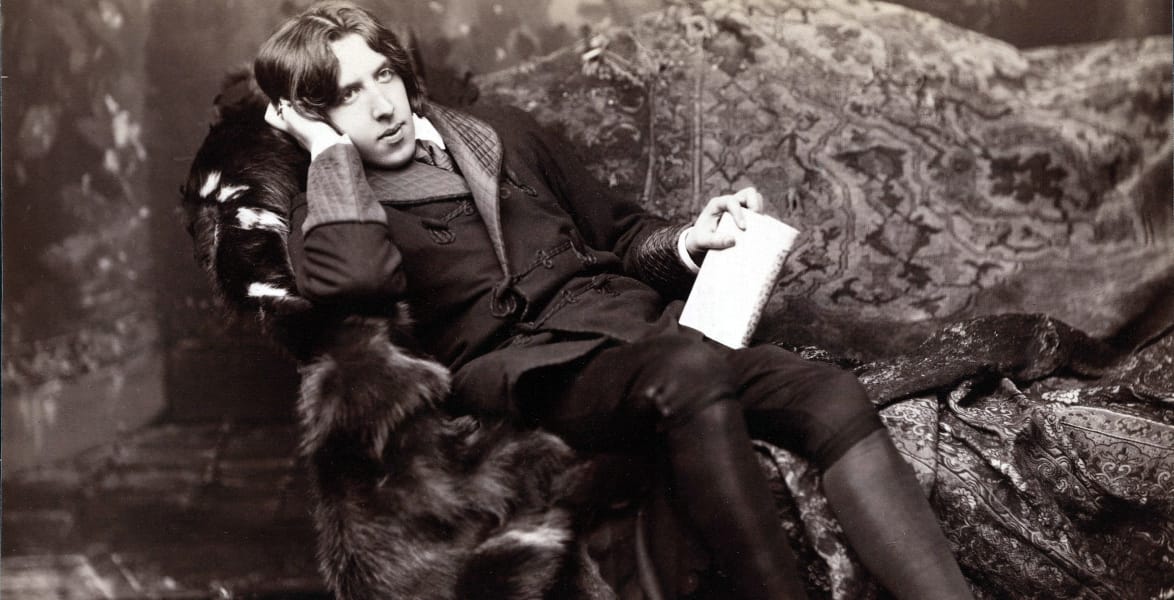In many publications on the Internet you can find a statement about a very unusual dying phrase of the famous writer. We have verified the accuracy of this story.
In different sources, Wilde’s dying phrase is mentioned in slightly different wording: sometimes - “This wallpaper is terrible. One of us has to go", Sometimes - "Either the wallpaper goes away or I", and sometimes - "Either me or this terrible wallpaper" Some publications even specify what kind of wallpaper didn't like it to the writer: "Either me or this disgusting floral wallpaper"
In 1895, Oscar Wilde, who was by that time one of the most famous prose writers and playwrights in Great Britain, was convicted for “gross indecency” (a euphemism for homosexual relations) and was sentenced to two years in prison. The trial was extremely loud, therefore, upon release, Wilde chose to leave the UK. He settled in France, and lived under a pseudonym and often moved from place to place to avoid meeting with old acquaintances, journalists or simply curious ordinary people who recognized the scandalous writer. His last address was the Hotel Alsace in the Saint-Germain quarter of Paris (now the hotel is simply called "Hotel"). “This poverty really breaks the heart: it is so dirty, so completely depressing, so hopeless,” Wilde described his life in Alsace in one of letters.
In September 1900, Wilde caught a cold and the illness caused complications in his ear. His condition worsened every day, and he was eventually diagnosed with meningoencephalitis. In his lecture "The Last Hours of Oscar Wilde» professor Joseph Bristow from the University of California, reconstructed in detail the ending of the writer’s life. It relied on rare documents, including letters and notes from two key witnesses to Wilde's final days: his friend Reginald Turner, who spent the last week of his life with the writer, and an Irish priest Cuthberta Dunn, who converted Wilde to Catholicism on his deathbed. None of them mentioned the wallpaper phrase. According to Bristow, she first appeared in the journalist's memoirs Claire de Pratz, published in the magazine L’Européen almost 30 years after Wilde’s death. She claimed that the writer, suffering from poverty, perceived the tasteless hotel wallpaper as a symbol of the decline of his life and once told her: “You see, my child, there is a duel to the death between me and this wallpaper. One of us must stay here: either they or I.”

However, The Quote Investigator portal leads An earlier source that mentions Wilde's complaints about wallpaper is the diary of an Irish writer Lady Gregory. In 1928 (a year before de Pratz's memoirs were published), she wrote: “I came across a letter from Paris, December 1908, from W. B. Yeats. He writes that the day before at Maud's, Gonne met a friend of Oscar Wilde, who told him a strange heroic story about Wilde's death. He died in terrible agony, putting his hand in his mouth to muffle his screams. He lived in deep poverty, often without money for food, and claimed that the wallpaper was killing him. “One of us had to leave,” he said.”
However, neither De Pratz nor Oscar Wilde's unnamed friend claimed that these were the writer's dying words. De Pratz did not indicate at all when exactly this conversation took place between them. As Bristow notes, the writer lived in “Alsace” for five months, so these conversations may have taken place long before he became ill.
According to The Quote Investigator, the phrase about wallpaper as Oscar Wilde's dying words was first published by the Liverpool Echo on November 30, 1950, under the heading "Echoes and Gossip of the Day." The short note, entitled "Wilde's Last Words", read: "'This wallpaper is killing me; one of us must go' - Oscar Wilde on his deathbed on this day 50 years ago."
Thus, it appears that Wilde did make a quip about wallpaper in his room at the Alsace Hotel—perhaps more than once. However, there is no evidence that these were his last words. In the letters and memoirs of people who were direct witnesses of Wilde's illness and death, this phrase is not mentioned.
Cover photo: screenshot National Portrait Gallery
Read on topic:
- Arzamas. Jokes about Oscar Wilde
- Did Caesar say: “And you, Brutus!”?
- Did Gagarin say: “I’m burning! Farewell, comrades!”?
- Is it true that before his death, Steve Jobs criticized the pursuit of wealth?
If you find a spelling or grammatical error, please let us know by highlighting the error text and clicking Ctrl+Enter.






